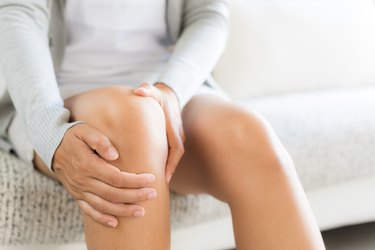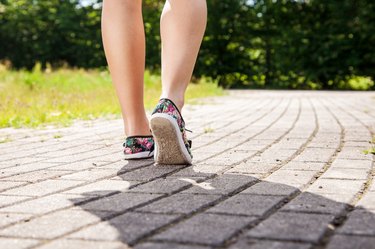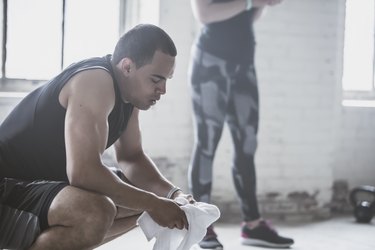
The tingle of your pre-workout kicking in is one thing, but feeling a tingling in your legs after a workout is another. It might seem concerning, but it's not always a cause for alarm.
As blood flow increases
Video of the Day
Video of the Day
In addition, new workout shoes can cause your legs to tingle, especially if you've tied them too tightly (or possibly even if they're too loose), says Steven E. Mayer, MD, sports medicine physician at the Northwestern Medicine Running Medicine Clinic. Same goes for workout clothes if they fit too snuggly and cramp your circulation.
These common causes of tingling in the calves after exercise aren't the only things that might cause the sensation, however.
"There are many causes of tingling in the leg, but the most important thing to do first is to make sure the description is accurate," says Merije T. Chukumerije, MD, a cardiologist with Cedars-Sinai Medical Network. "Is it tingling, itching, pain, numbness or something else? The description is key in determining the cause."
Plus, it's important to know when the feeling might be more serious and require a trip to the doctor.
So, what causes that tingly, uncomfortable feeling in your legs that's sometimes referred to as "pins and needles?" Below, we dive into eight potential reasons.
1. A Histamine Response
If you feel tingling and itching in your feet after exercise, perhaps traveling to your butt and lower abdomen, it could be a histamine response. Yes, it might feel like you're "allergic to exercise," but don't retire your running shoes just yet.
"The body releases histamine as a means to improve circulation during exercise," Dr. Chukumerije says. "This histamine release results in the same sensation one feels during an allergic reaction, causing an itching sensation in the locations of maximum histamine release during exercise, the muscles."
Histamine plays an important role in helping your muscles combat fatigue
This is a good thing for your body — so most people won't need to pop an allergy med before exercise. The substance helps your muscles produce nitric oxide, a compound that helps cells convert food into energy more efficiently and decreases with age, per a January 2018 research review in Exercise and Sport Sciences Reviews.
Fix It
You generally don't need to do anything about the natural histamine your body produces. But if the tingling really bothers you, talk to your doctor. In rare instances, an extreme allergic reaction could cause anaphylaxis, so it's worth discussing your symptoms, especially if you experience chronic tingling in your legs after exercise.
2. Circulation Issues
During an intense workout, much of your blood is directed to your working muscles, and your blood vessels expand to accommodate the increased flow. However, as mentioned above, tight shoes or clothing can restrict your blood flow and lead to a tingling sensation.
Another potential, more serious cause of impaired circulation is peripheral artery disease (PAD) — a narrowing of the blood vessels — according to the American Heart Association (AHA).
"If the tingling or discomfort is due to peripheral artery disease, this is explained by plaque buildup, or atherosclerosis, in the arteries obstructing blood flow to the muscles, limiting the amount of nutrients and oxygen the muscles receive," Dr. Chukumerije says.
This reduced blood flow can lead to ischemia, per the AHA, and symptoms include pain and tingling in the extremities, which can radiate up one or both legs. PAD may also cause your legs to ache or feel crampy.
Fix It
PAD requires medical treatment. If you experience the above symptoms, see your doctor for a proper diagnosis and treatment plan.
3. Low Electrolytes
Electrolytes like sodium, potassium, calcium and magnesium help regulate your nerve and muscle function and hydration levels and repair damaged tissue.
"Exercise causes changes in your body's fluid balance to shift, and this can lead to electrolyte imbalances and/or dehydration, which can affect how the muscles contract and relax," Dr. Chukumerije says.
This's more likely if your sodium, calcium and potassium levels fall, because your muscles need those electrolytes to contract, according to the Cleveland Clinic.
Fix It
To keep your electrolyte levels balanced during and after a workout, drink plenty of water to stay hydrated. During longer or heated workouts, sports drinks containing calcium and potassium can also help.
For a helpful benchmark, you can aim to follow these hydration guidelines from the American Council on Exercise (ACE):
- 17 to 20 ounces of water 2 to 3 hours before exercise
- 8 ounces 20 to 30 minutes before exercise
- 7 to 10 ounces every 10 to 20 minutes during exercise
- 8 ounces of water or a sports drink within the 30 minutes after exercise
4. A Pinched Nerve
"For some, poor functioning nerves can cause tingling after exercise," Dr. Chukumerije says. "This is due to dysfunctional peripheral nerves which may send erroneous messages to your brain."
When the sensation of nerve pain in the legs after exercise runs down both sides, chances are the problem is in your lower back.
Spinal stenosis is a compression of the spinal cord in the lower back, and can be an indicator of arthritis, injury or aging, according to the Mayo Clinic.
Tingling or numbness is often accompanied by pain traveling down both legs that's worse when standing up and eases up when you're seated or bending forward. You might also have trouble with your balance or changes in bowel or bladder control.
The tingling could also be due to peripheral neuropathy, a nerve impingement that can be caused by structural issues or diabetes, per Johns Hopkins. Or perhaps it's meralgia paresthetica, a nerve condition that can be caused diabetes or weight gain and causes numbness, burning pain and tingling along the outer thigh, per the Mayo Clinic.
"The most common thing we see after exercise from the nerve standpoint is called tarsal tunnel syndrome, where there is impingement at the ankle of a nerve that goes into the foot," Dr. Mayer says.
Fix It
Take a break from your workout routine and get a thorough medical evaluation if your tingly legs give you cause for concern.
Speak to your doctor if you fall during a workout and then have chronic leg tingling. They can help determine what's causing the sensation and whether or not it's coming from a pinched nerve, and then recommend the best treatment for the tingling feeling.
5. Back Issues
If tingling isn't normally part of your exercise experience and you haven't added any new constrictive clothing to your wardrobe, a sudden onset of leg tingling after walking or any other physical activity could indicate injury.
Injury to your lower spine's sacroiliac (SI) joint — such as when you take a misstep on gym equipment or step unexpectedly onto an uneven surface when jogging — can cause tingling down the leg on one side of the body, according to June 2017 research in Clinical Neurology and Neurosurgery.
Some people are particularly susceptible to SI injury when they experience hormonal changes due to menstrual periods or pregnancy that cause ligaments to soften, causing
A herniated disc can also cause tingling, burning and pain down one leg and is common in those who are aging or have arthritis of the spine, per the American Association of Neurological Surgeons (AANS). Sciatica can cause similar symptoms, per the National Library of Medicine.
Fix It
"If the pain is coming from the lumbar area — like a sciatic nerve problem — we would initiate physical therapy, which is almost always helpful and resolves the problem," Dr. Mayer says.
But see your doctor for an evaluation instead of powering through the pain when it comes to back injuries. Failing to treat an injury appropriately can result in further problems — including being sidelined from your workouts for months.
6. A Neuroma
A neuroma occurs when a nerve bundle in your foot — usually between your third and fourth toes — becomes inflamed.
"The other most common thing we see that can give tingling into the foot during workouts is Morton's neuroma, which is impingement of the nerve between the toes," Dr. Mayer says.
It's common in runners with hypermobile feet and is characterized by tingling pains that shoot up your leg, as well as numbness and a burning feeling in your foot, according to the American Podiatric Medical Association.
Fix It
Symptoms may come and go and should be treated with ice to reduce inflammation. Apply ice to the feet for 10 to 15 minutes ever hour for five to six hours. You can also use athletic shoe inserts designed for neuroma relief, which help reduce irritation during exercise by stabilizing the feet.
You can also manage your symptoms by applying padding directly to the affected area. To make sure you find the exact position, bend your toes back or press the sole of your foot until you find the most painful spot. If this doesn't help, see a podiatrist.
7. Chronic Exertional Compartment Syndrome
A tingling sensation in your legs could be due to chronic exertional compartment syndrome. This is a fairly rare neuromuscular disorder that's most likely to occur in people who engage in repetitive activities that involve impact, like running, per the Mayo Clinic.
"Exertional compartment syndrome is where the fascia layering the muscles causes tightness and can cause pain in the muscles as well as numbness into the leg or foot," Dr. Mayer says.
The tingling usually affects the lower legs, and other symptoms can include pain, tightness and swelling in the affected limb.
Treatment
This condition is likely to arise soon after you start exercising and get progressively worse during your session. At first, the symptoms will disappear shortly after you stop exercising. However, if exertional compartment syndrome gets worse, your symptoms might linger for several days. If this is the case, stop exercising and see a doctor.
8. Entrapment Syndrome
Entrapment syndrome is another rare but relatively serious condition that can cause tingling in your legs, per the Cleveland Clinic.
The tingling sensation comes from trapped blood in the popliteal artery, which is situated behind your knee. If the artery becomes pinched, the amount of blood delivered to your lower leg is reduced, which results in a tingling sensation and sometimes feelings of heaviness or pain.
Fix It
Repetitive bending of your legs while running can cause the artery to become pinched in your calf muscle. Usually, the artery is relieved from the compression after you stop running, but in some cases, surgery is required to free the artery again so it can properly deliver blood again.
When to See a Doctor About Chronic Tingling After Exercise
"Most of the time, tingling in the legs after exercise is benign and will resolve after a few minutes of rest," Dr. Chukumerije says. "The most common cause of tingling in the legs are muscles that are depleted of nutrients due to dehydration and/or electrolyte imbalances."
If the tingling is minor and doesn't bother you, it's fine to go about your day. As the blood is no longer needed for strenuous exercise, some of the blood flow will leave your muscles and the tingly feeling may stop.
It helps if you've got a smart recovery program in place after you exercise, per the National Institute for Fitness and Sport. Rest, hydrate and fuel your body with nutrient-dense foods to help your legs repair. Massages, alternating hot and cold showers or icing muscles can also reduce muscle swelling that may make your legs feel tingly.
If your tingling doesn't go away after a reasonable amount of time — say, an hour or so after you stop exercising — consider chronicling it in a workout journal. Note when you first noticed the tingling: Does it appear after you've been working out for several minutes or only after stopping?
Jot down exactly where you're feeling the sensation. For example, new running shoes can rub nerves on the top of your foot that make your legs tingle after walking if they're laced too tightly. Tingling in muscles after exercise that runs down the back of your thighs could indicate problems in your lower back.
Your notes will come in handy, particularly if your tingling appears only intermittently. Are you wearing a particular item of clothing that could be cutting off blood flow or pressing on a nerve? Do you feel any pain in your body at the same time, whether you think it's related or not?
Careful note-taking can help you communicate with your doctor and get an accurate diagnosis should the sensation become a regular part of your exercise routine.
"Early identification and treatment can help save limbs and lives," Dr. Chukumerije says.
FAQ
Common Questions
Is it normal for your legs to feel tingly after a workout?
While it's not "normal" per se, some of the reasons for tingling legs after exercise are common and aren't necessarily cause for concern. For instance, it may be due to a histamine response, in which your body releases histamine as a way to improve circulation during exercise. However, if your tingling legs last more than an hour or so after exercise or the sensation keeps recurring, it's important to see your doctor for a diagnosis and treatment plan.
Can overworked muscles cause tingling?
Yes, this is a potential cause. You may feel tingling in your legs after a back injury or compartment syndrome, both of which can be caused by overworked muscles.
How do I stop my legs from tingling?
The fix could be as simple as loosening your shoe laces or not wearing tight, compressive clothing. Get plenty of rest, staying hydrated and fueling your body with nutrient-dense foods can also help, per the National Institute for Fitness and Sport, as can massages and ice. If your legs don't stop tingling within an hour or so after trying these techniques, check in with your doctor about possible causes and treatments.
- Biological and Pharmaceutical Bulletin: "Roles of histamine in exercise-induced fatigue: favouring endurance and protecting against exhaustion"
- Exercise and Sport Sciences Reviews: "The Intriguing Role of Histamine in Exercise Responses"
- Progress in Brain Research: "Chapter 11 - Exercise and cerebrovascular plasticity"
- American Podiatric Medical Association: "Neuromas"
- National Institute for Fitness and Sport: "The Importance of Recovery After Exercise"
- AHA: "What is Peripheral Artery Disease (PAD)?"
- AHA: "Silent Ischemia and Ischemic Heart Disease"
- Cleveland CLinic: "Electrolytes"
- ACE: "How Hydration Affects Performance"
- Mayo Clinic: "Spinal stenosis"
- AANS: "Herniated Disc"
- Mayo Clinic: "Chronic exertional compartment syndrome"
- Cleveland Clinic: "Popliteal Artery Entrapment Syndrome (PAES)"
- Mayo Clinic: "Meralgia paresthetica"
- Clinical Neurology and Neurosurgery: "Leg symptoms associated with sacroiliac joint disorder and related pain"
- NLM: "Sciatica"


